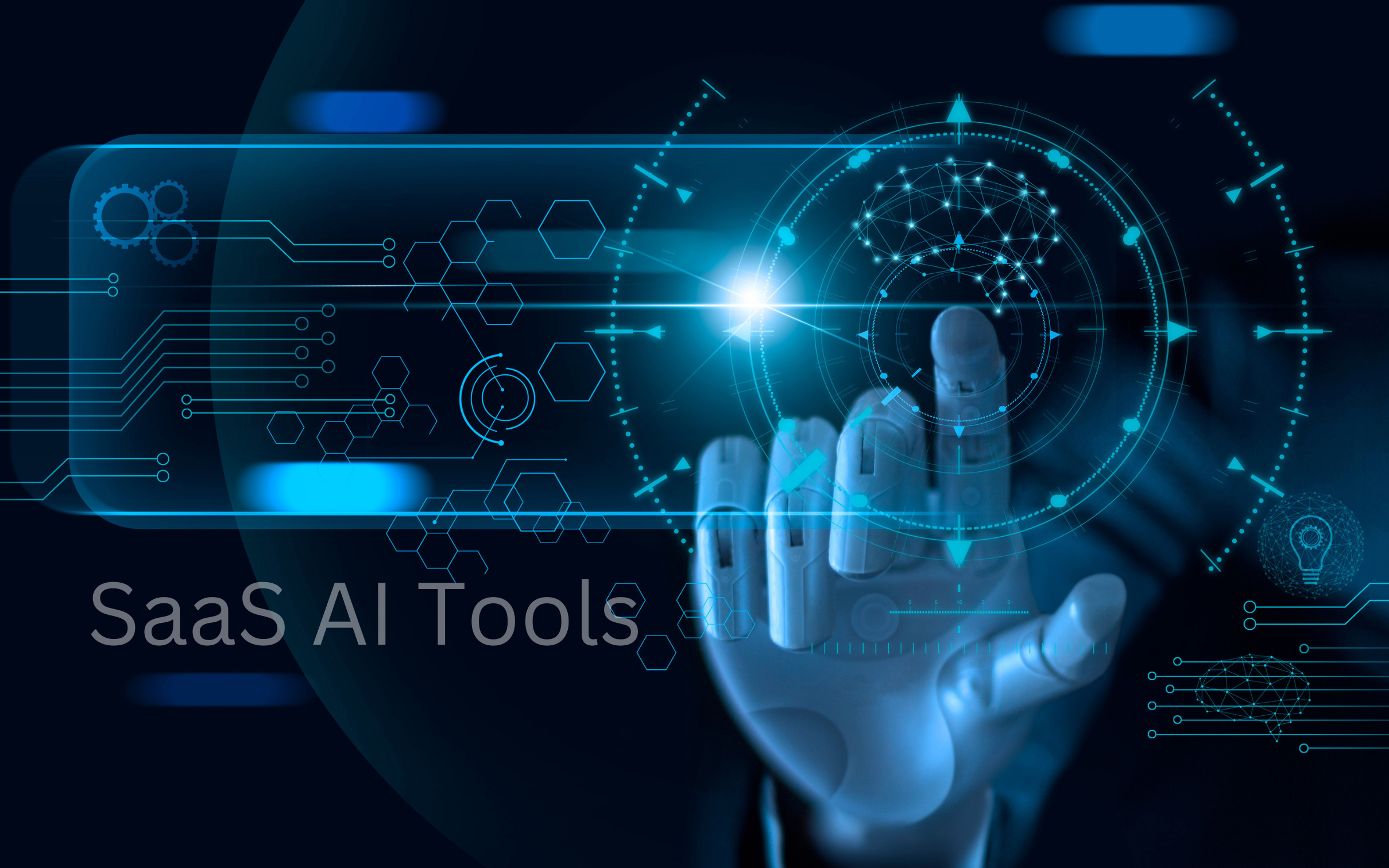Software as a Service (SaaS) has become a significant platform that integrates with Artificial Intelligence (AI) a tool that is transforming business. The adoption of SaaS AI tools has risen and now impacts almost every field of business operations – from customer relations and marketing to data analytics and decision-making.
When exploring the contemporary world of software solutions, particularly SaaS AI, the importance of these tools in today’s business landscape should be defined. These SaaS AI platforms are not overhyped technologies; they are a revolution in the ways that companies deploy innovation to optimize their competitive performance and release value.
What are SaaS AI Tools?
SaaS AI tools can be described as cloud-based software applications that human users interact with and which possess artificial intelligence features for making intelligent decisions and performing tasks.
These Saas AI tools are the carriage of SaaS, the ability to grow seamlessly with the addition of new clients while having the complex functionality of AI algorithms and networks that can learn, evolve, and get better over time.
Key characteristics of SaaS AI tools include:
1. Cloud-based delivery: These tools are stored on other servers and can only be operated through the internet; they do not require installation on a computer and this saves on the amount of space needed and time spent on maintaining them.
2. Subscription-based model: Subscribers usually pay per usage of the service continuously rather than having to purchase the product.
3. AI-powered features: Such smart functionalities can be enabled using basic and advanced AI technologies including machine learning, natural language, computer vision, and predictive analysis.
4. Continuous updates and improvements: These reflect the AI models gone into these tools where the models are constantly learning and presenting users with better abilities every time.
5. Integration capabilities: It is possible to find several Saas AI tools that can easily connect to other systems within an organization to create an efficient flow of information across different departments, elevating the capabilities of other connected applications within the organization.
Understanding SaaS and AI
To fully grasp the potential of SaaS AI tools, it’s essential to understand the individual components: Obviously, SaaS and AI.
SaaS
SaaS is the model of software distribution in which applications, and associated data, are provided to users over the web on a billed basis. This model has several advantages over traditional software deployment:
1. Accessibility: It makes work from other devices possible since the software can be contacted from any other device with an internet connector.
2. Cost-effectiveness: SaaS also has the advantage of clients not having to invest greatly in hardware to support the application and less strain put on in-house IT teams for maintenance.
3. Automatic updates: Update and patch management are also performed by the service provider, meaning that consumers always receive the latest release of the service with potentially new features and bug fixes.
4. Scalability: SaaS applications are highly flexible and can be easily modified in terms of their complexity to meet specific business requirements without requiring extensive adjustments to the underlying system infrastructure.
5. Rapid deployment: Through that, it can be intended and deployed rapidly, so the time to value is limited for businesses.
Artificial Intelligence (AI)
AI is the process of using machines to mimic the cognitive functions of human beings to be able to make decisions for themselves. It encompasses various subfields, including:
1. Machine Learning (ML): The competence of the solutions to learn experience and enhance their functionality without previous explicit coding.
2. Natural Language Processing (NLP): The ability of computers to comprehend human language, the capability to explain messages, and the ability to create human language.
3. Computer Vision: A branch of AI that is used by computers that involves teaching the machine to understand visual data from the world.
4. Deep Learning: Deep learning is a branch of machine learning exclusively designed for neural networks and can work on huge volumes of unstructured data.
5. Predictive Analytics: A statistical method of forecasting that involves the feeding of data into algorithms to predict future occurrences.
The Use of SaaS and AI
The combination of SaaS and AI creates a powerful synergy that offers several benefits:
1. Democratization of AI: It means that by using SaaS, different organizations can leverage specific AI solutions, implement them into their business, and benefit from it, not only large-scale companies with substantial funds.
2. Continuous improvement: There is always the ability to refine the AI models used in SaaS since applications are stored and accessed remotely in the cloud.
3. Scalable AI solutions: When it comes to business applications, SaaS platforms are perfectly capable of processing the computations enabled by AI algorithms, effectively allowing businesses to expand their AI use without having to field new, costly hardware.
4. Data-driven insights: After analyzing big data provided through SaaS platforms, AI gives valuable insight and predicts fluctuations in businesses.
Benefits of AI-powered SaaS tools
1. Enhanced Efficiency and Automation
Specifically, AI-oriented SaaS solutions are well-suited to centralizing and automating repetitive and complex processes. Such auto-organized tools also enable the immediate analysis of huge volumes of information, pattern recognition, and action initiation without the necessity of human interference and the application of machine learning algorithms to software tools.
2. Improved Decision Making
In comparison to people, AI algorithms are capable of delivering results in the form of data analysis with much higher rates and in real-time. This then allows for quick and accurate decision-making based on the analyzed information within the business environment.
3. Personalization at Scale
AI which can be incorporated into the SaaS tools makes it easy to create user-specific experiences or interfaces. Such tools can help to identify users based on their behavior and history of using the platform and deliver content and other personalized experiences to each unique user.
4. Continuous Improvement and Learning
AI-integrated SaaS tools, on the other hand, are different and they have the inherent advantage of evolving when exposed to new data. These tools are ideal when handling enormous amounts of data and incorporating user feedback to improve their performance and results.
Top 10 SaaS AI Tools
Here are the details for top SaaS AI Tools:
1. ChatGPT
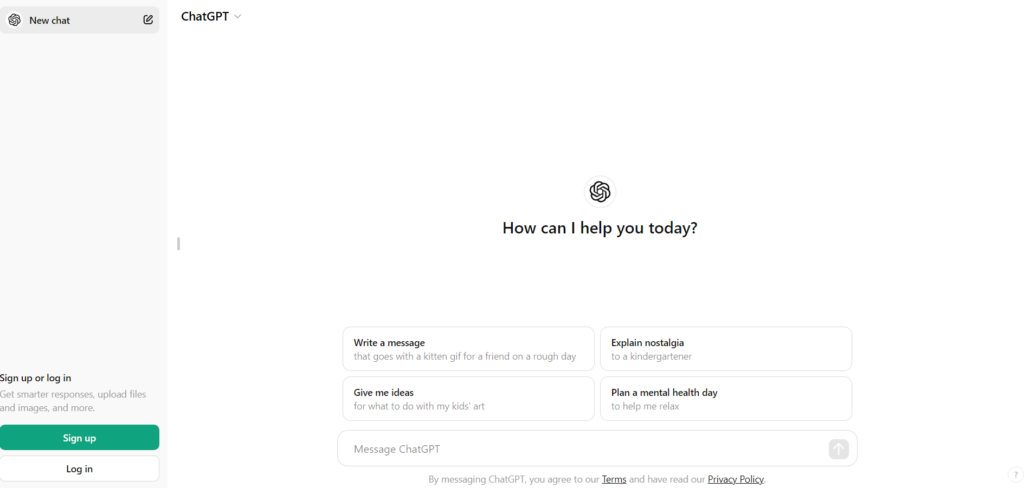
It is an artificial intelligence conversational model that is under the category of language models which was developed by OpenAI. It is capable of analyzing the textual input it receives and then developing a machine-generated text based on this input.
It can be used for content writing, for customer support, or as a helper in coding and features writing. The ability to deliver subsequent answers based on context makes ChatGPT helpful in various industries to strengthen and boost key processes such as communication.
Key Features:
- Knowledge processing including understanding and generation of natural language
- Context-aware responses
- Multi-turn conversation capability
- Customizable outputs
Pros:
- Suitability for various needs within business and commerce
- Updated from time to time to accommodate the new change.
- Possesses the capability and flexibility to perform even detailed and intricate kinds of tasks.
Cons:
- May sometimes generate wrong or even biased information to the people.
- Linked to another writing style and thus demands the proper and efficient design of the prompts.
- Restrictive knowledge
Website: https://openai.com/chatgpt
2. Grammarly
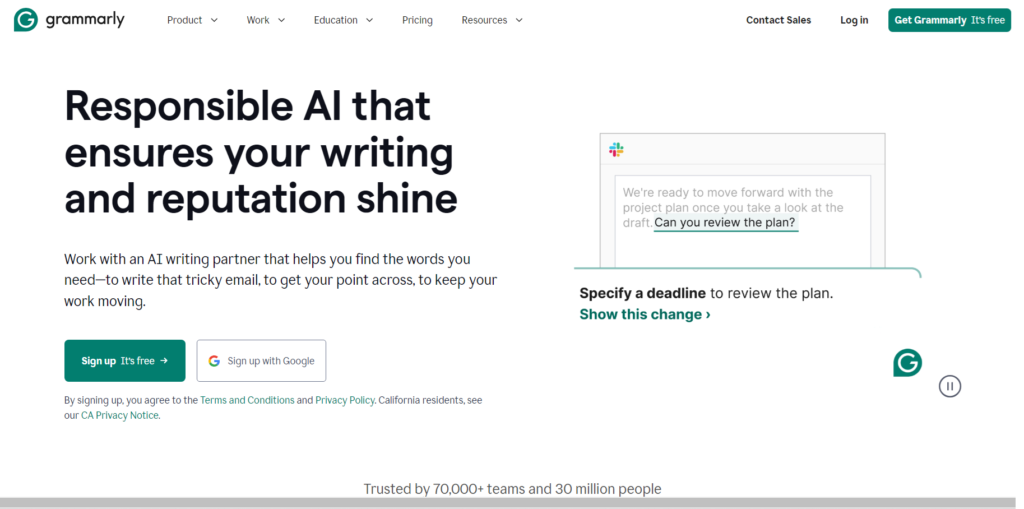
Grammarly is an application based on Artificial Intelligence Technology that assists students and writers in modifying and enhancing their writing style by identifying grammar, spelling, punctuation, and style mistakes. It has a live correction option and provides explanations that make users able to detect their mistakes.
Grammarly then uses AI algorithms to determine the context in which the writing will be used so that it can offer more relevant and accurate recommendations for that writing.
Key Features:
- Offer real-time grammar and spelling checks.
- Ideas for its styling and getting the right tone
- Plagiarism detection
- It has been integrated with a range of platforms and other applications
Pros:
- Enhances the substance, form, and style of writing and reduces subjectivity.
- Also, it provides a user-friendly experience via browser extensions and app integrations.
- Services are free but there is a premium service as well.
Cons:
- Certain options are presented in the paid version only
- Most likely does not cover all contextual mistakes
- May sometimes be rigid with respect to one or more issues
Website: https://www.grammarly.com
3. Tableau
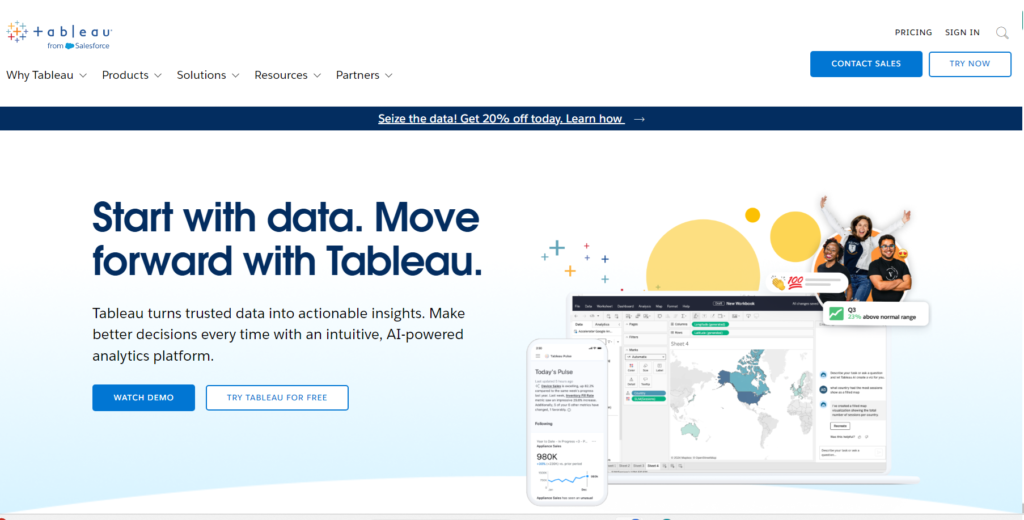
Tableau is a Business Intelligence & data visualization with key AI capabilities that enables users to analyze data and gain insights. With Power BI, users can design compelling dashboards and reports, as well as analyze data and create visualizations, with little programming skill required.
Some of the other features are that the software supports natural language and natural next experiences with the ability to pose questions in natural language and receive answers with data and other key findings from the drawn data set.
Key Features:
- They are organized using drag and drop, one can create visualizations.
- Natural language queries
- Some of the insights produced could be generated automatically and therefore do not require explanations.
- For the medium and comprehensive levels of integration, the corresponding data sources are integrated with other data sources.
Pros:
- The design also involves simplicity that makes the system accessibility friendly to non-technical persons.
- The mobility of data and powerful data analysis capabilities
- They help in handling big data and large data processing.
Cons:
- Spectrum of advanced features and steep learning curve
- Suitable for use when data has been pre-processed adequately for best outcome.
Website: https://www.tableau.com
4. Exceed.ai
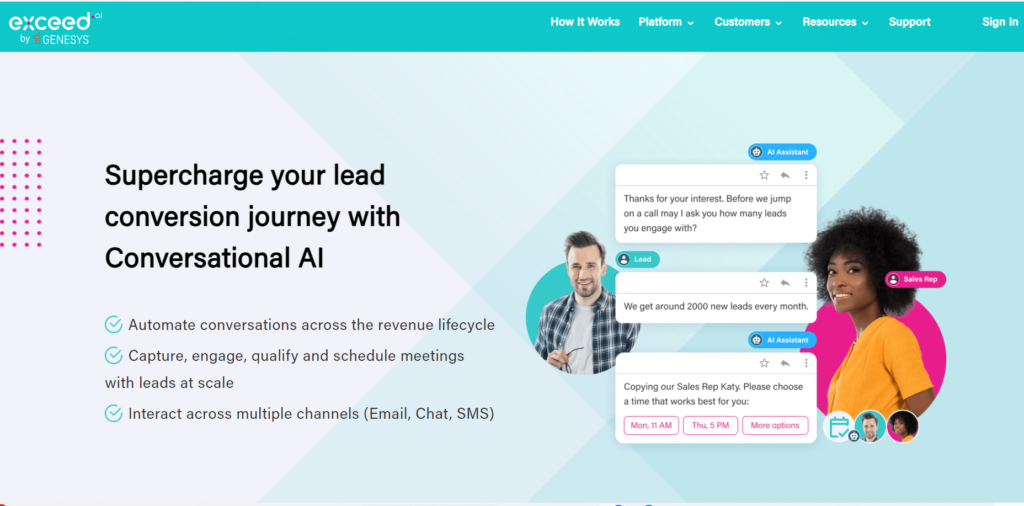
Exceed.ai the specific training for this application is the AI-oriented sales assistant that qualifies leads and follows up with them on an automated basis. It can interact with leads based on email and the chat while filtering and conducting meetings with sales based on some presets for further identification.
It increases sale pitches’ conversion rates because it gives the sales team priority to target quality leads without leaving out any potential opportunities.
Key Features:
- Engagement and qualification of sales leads without the need for human intervention.
- Mapped with the CRM systems
- Customizable conversation flows
- Statistical analysis and monitoring of business outcomes
Pros:
- Reduces the time taken on various aspects of sales activity
- Guarantees engagement of leads
- Affordable and effective tool for those businesses that already have a significant flow of customers and clients.
Cons:
- Might need slight adjustments before they can run with the highest level of efficiency.
- This particular paradigm is slightly less personalized compared to direct human interaction.
- Misunderstanding if the questions posed are complicated.
Website: https://exceed.ai
5. MonkeyLearn
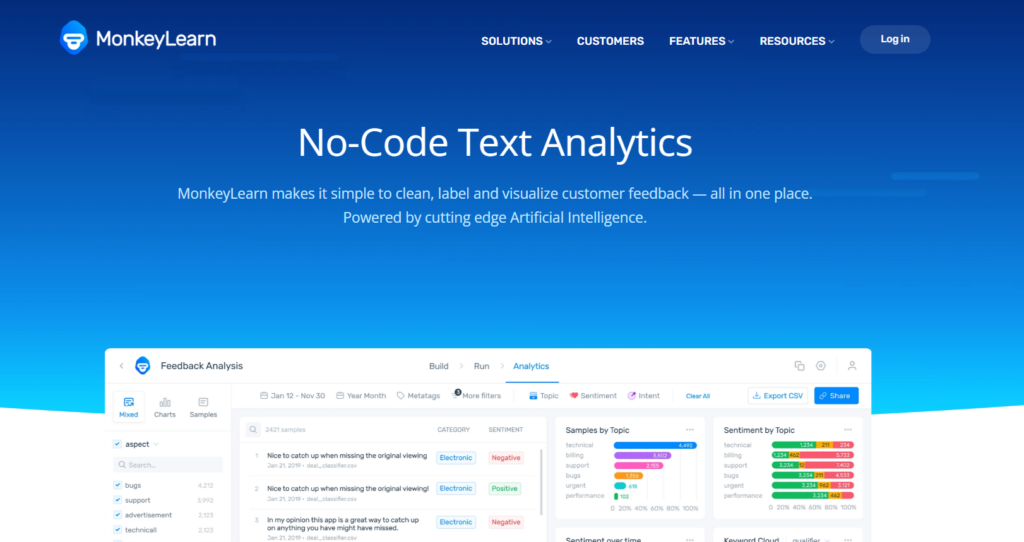
MonkeyLearn is a machine learning service that focuses on text analysis, and which enables users to create and employ models with little coding involved. It also provides, out of the box solutions that include sentiment analysis, key phrase extraction and text categorization amongst others , while the ability to build new models is also possible.
MonkeyLearn’s easy-to-use platform and API further extend its adoption by different organizations and industries for text analytics.
Key Features:
- Basic and advanced text analysis models available
- Clear for defining and training of various models
- It also includes APIs and integrations available for multiple platforms.
- Real-time analysis capabilities
Pros:
- It is navigable and easy to understand by an ordinary client or a person not very much in touch with technology.
- They run on a scalable platform which is highly flexible and can be easily made to fit specific requirements.
- Provides a range of products and services which can be guaranteed to be used immediately.
Cons:
- Specific models may need large amounts of training data.
- Pricing may turn out to be somewhat costly.
- Primarily designed for text-related tasks
Website: https://monkeylearn.com
6. Chorus.ai
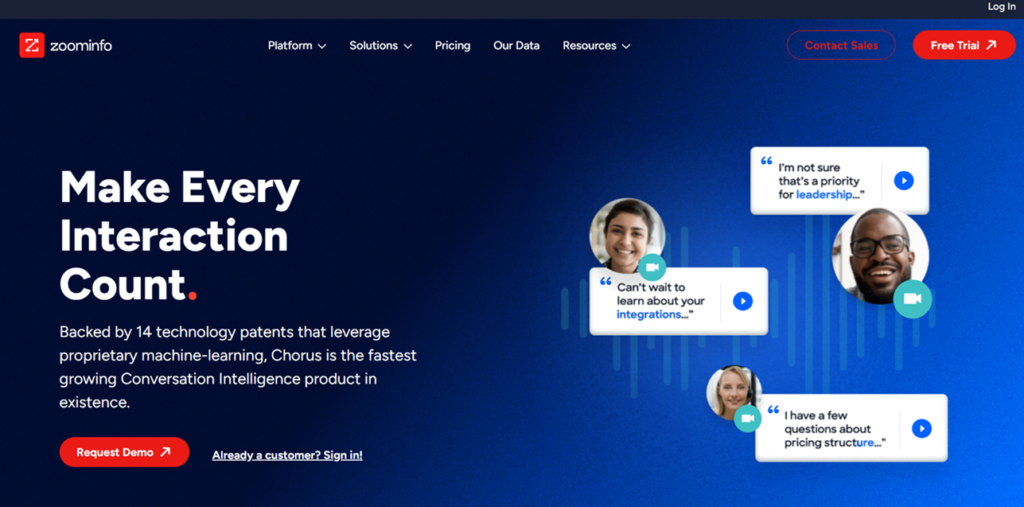
Chorus.ai, a sales effectiveness tool that leverages Natural Language Processing and Machine Learning from Artificial Intelligence. Sales coaching involves taping and transcribing calls and meetings with customers for the purpose of gaining understanding of the level of interaction with various customers and those of the sales department and the general market.
Taking advantage of NLP technology the platform aims at detecting key moments, topics and coaching opportunities for sales representatives.
Key Features:
- This also includes features such as the automatic recording and transcribing of all the phone calls made by the business.
- AI-powered conversation analysis
- It is integrated with client relationship management systems.
- Coaching and training recommendations
Pros:
- It provides valuable insights for the sales strategy.
- Improve sales team productivity using training and guidance
- Enhances the understanding and perceptions of customers.
Cons:
- May be privacy infringement on some customers
- Only suitable for large teams which can afford the resultant extra costs
Website: https://www.chorus.ai
7. Crayon
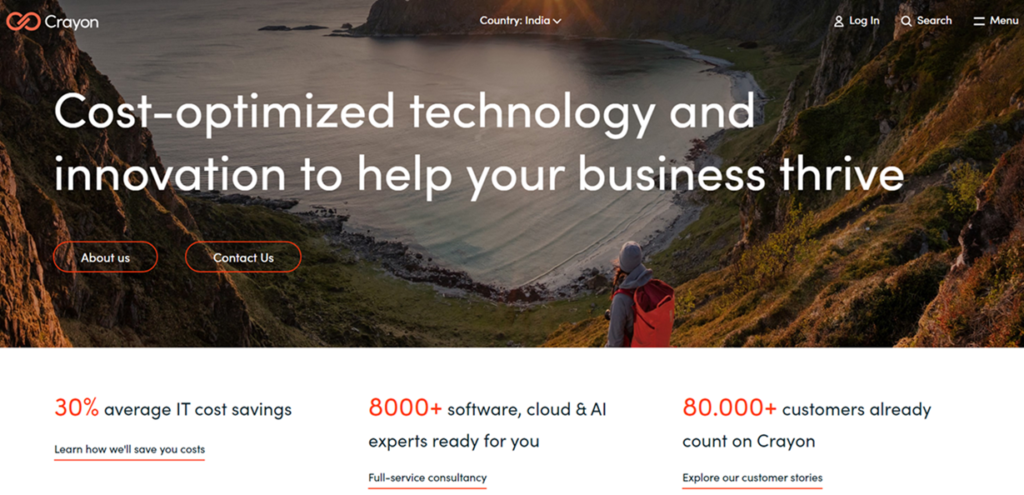
Crayon is a form of artificial intelligence that focuses on monitoring competitors’ activities and provides businesses with insights about them.
As an AI tool that utilizes data, augments data collection and analysis from multiple online sources with real-time machine learning capabilities to monitor updates to competitors’ products, changes in product pricing, marketing activities, and other factors.
Through Crayon, businesses are able to monitor their competitors; gaining greater insights into the market to make better strategic decisions.
Key Features:
- Automated competitor tracking
- Real-time alerting or notifications are needed
- Dynamic KPIs, scorecards, and balanced-sheeting
- Integrating with your CRM or other business applications
Pros:
- Include extensive competitive intelligence acquisition
- Efficient data collection and analysis by reducing human time consumption
- Adopted framework that would provide recommendations that can be implemented to make strategic actions.
Cons:
- The data quality of the content analyzed for this paper depends on the sources referenced.
- May need to be checked with other means especially when the contents are important.
- In dealing with massive data sets it can be cumbersome.
Website: https://www.crayon.co
8. Jasper (formerly Jarvis)
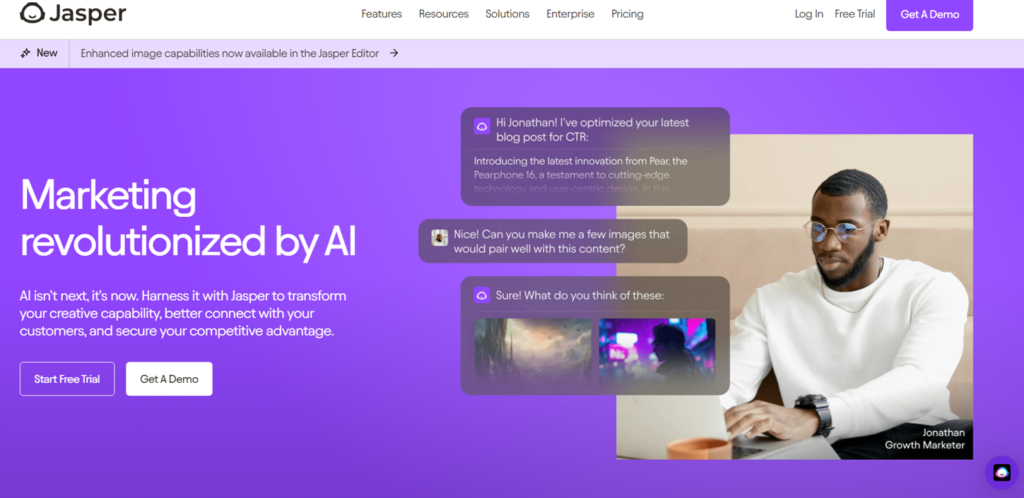
Jasper is an AI writing tool that the user uses to create volumes of quality written content without much struggle. It employs machine learning techniques that create blog articles, social media captions, product descriptions, and such other related materials.
Jasper can combine multiple writer skills and even the tone of the content, thus it is perfect for content marketing specialists, copywriters and business owners who want to create content at a much higher pace.
Key Features:
- AI-powered content generation
- Templates for different content types .
- SEO optimization capabilities
Pros:
- It enhances the frequency at which contents are developed tremendously
- Useful in cases when one has no idea what to write about
- Conforms to a number of standards of writing, both in terms of overall format and industry-specific requirements.
Cons:
- There could be something wrong with the type of output and it may take a while to be edited
- Time taken to build effectiveness
- This can open the door to over-reliance on material that AI can generate quickly on its own.
Website: https://www.jasper.ai
9. HubSpot
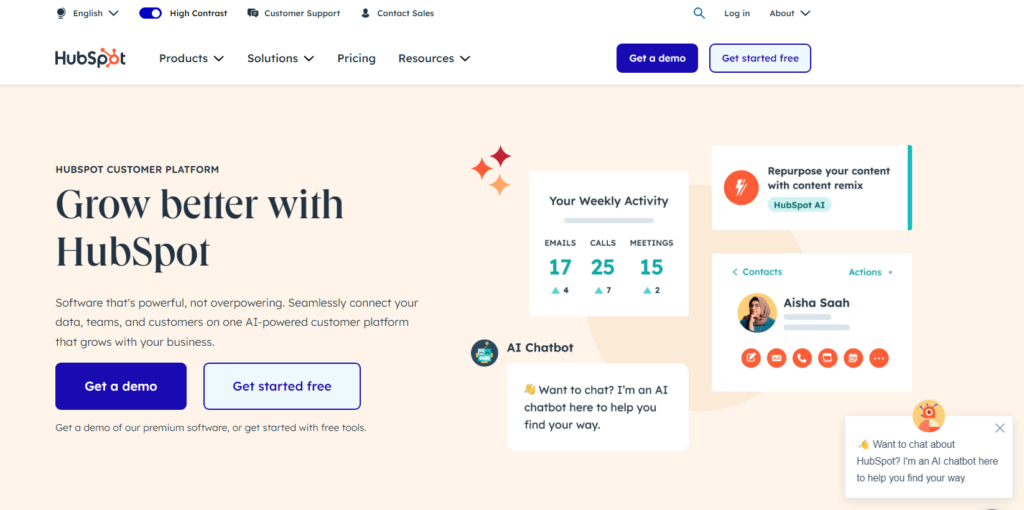
HubSpot as an effective inbound marketing, sales, and customer service solution is an AI-powered tool. Some of the AI-embedded tools are lead scoring, content suggestions, and even the chatbot for customer assistance.
Through the utilization of artificial intelligence, HubSpot in particular can assist companies in managing marketing tasks, increasing the acquisition of customers and enhancing the quality of customer relations.
Key Features:
- Use of the AI-powered lead scoring for predicting sales outcomes.
- Content strategy recommendations
- Implementation for customer help-desk
- Automated workflow creation
Pros:
- Unified tool specifically for marketing and selling, as well as customer support.
- Powerful automation capabilities
- Integrated, refined, and upgraded constantly.
Cons:
- A disadvantage to the small business since it may be costly in the long run.
- Learning curve to understand its functionality.
Website: https://www.hubspot.com
Read Also: Best SaaS Landing Page Templates
10. Gong
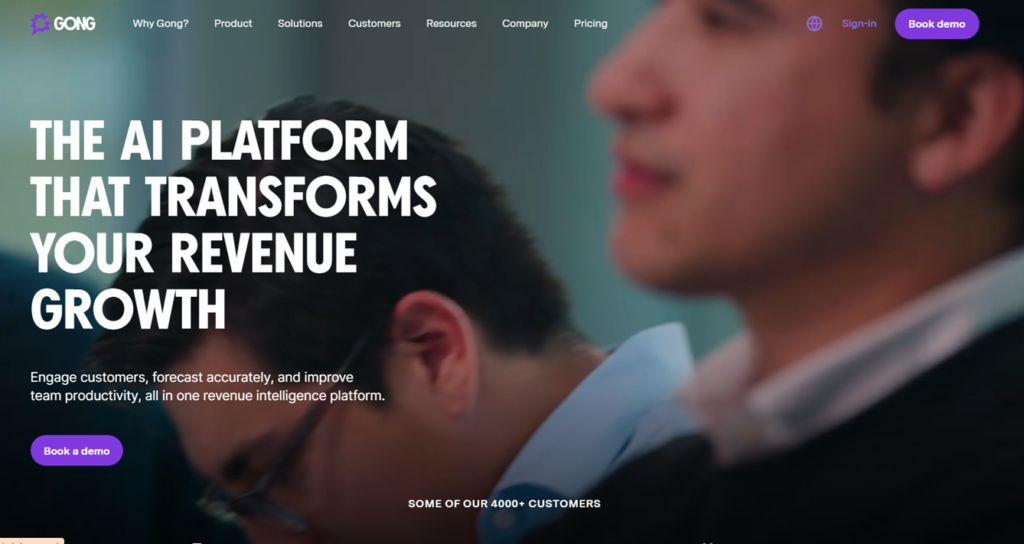
Gong is revenue intelligence software that leverages Artificial Intelligence to transcribe, analyze and deliver to sales representatives critical contextual insights on the call.
First, it captures voice notes from sales calls or calls to suppliers, takes notebooks of video conferences, as well as writings of emails and after analyting them, it segments and uses natural language processing to determine areas of strength, examples, and pitfalls.
Gong enables sales teams to decipher customers’ needs more efficiently to not only fine-tune their tactics but also secure a lead.
Key Features:
- AI-powered conversation analysis
- Pipeline analytics
- CRM systems and other business sales tools
Pros:
- Helps in making intelligent forecasts and proposals that can contribute towards the increase in sales.
- Improves on-boarding frameworks
- Assists in recognizing which procedures are effective in selling certain products and emulating those.
Cons:
- May breach customer privacy to a certain extent depending on the customers.
- Must be used all the time, especially within the sales team.
- May not be jointly affordable by organizations that are still in the process of establishing themselves.
Website: https://www.gong.io
Conclusion
Finally, these top 10 AI tools for SaaS are not confined to writing or content research but extend from jotting and writing aid to outreach and analytics. Thus, such solutions, powered by artificial intelligence, can help businesses underpin and advance their processes, as well as make sound decisions for successful functioning in their respective markets.
Read Also: Best 10 Cloud Computing Platforms
FAQs
Which kind of business can generate benefits from these SaaS AI tools?
At this moment, it is crucial for businesses – from developing startups to global corporations and focused on any type of industry and services.
How complex is it to implement these tools in an organization?
Many of these tools are easy to use and have a ‘point and click’ interface functionality as well as integration facilities. But some need initial configuration and familiarization to reach optimal operation for the users.
Can these intelligent tools replace genuine human employees?
These tools have the capabilities to automate many associated tasks and enhance general productivity, nevertheless the reason behind implementing these tools is not to eliminate workers.
